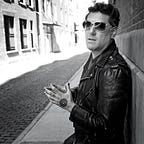The Enduring Legacy of Parapsychologist J.B. Rhine
Skeptics deem Rhine’s famous ESP trials a bust. The record says otherwise.
One of my intellectual heroes is parapsychologist J.B. Rhine (1895–1980), who pioneered ESP card experiments at Duke University in the early 1930s. One evening, one of my kids went online to test my judgment — and found it wanting.
The references that he and millions of others encounter today call Rhine’s trials polluted and unreliable. “Rhine’s results have never been duplicated by the scientific community,” Wikipedia reports, “…It was revealed that Rhine’s experiments into extrasensory perception (ESP) contained methodological flaws.” References to “flaws” or “errors” appear eight times in the article.
Red pill takers, choke it up.
But the data tell a different story, one that polemical skeptics have rendered difficult to discern. To find it, and Rhine’s real legacy, requires dialing back the clock for a moment before returning to the researcher’s efforts — and extraordinary evidence.
The Dawn of Parapsychology
“Organized psychical research can be dated, symbolically, from a conversation between Henry Sidgwick and his student F.W.H. Myers, one moonlit night in Cambridge about 1870, over the…
